Are you ready to dive into a world of underwater adventures? If you’re an ocean lover seeking thrilling experiences beneath the surface, scuba diving is the perfect activity for you. But where do you start? How do you ensure a successful and fulfilling scuba diving experience? This ultimate guide is here to answer all your questions and equip you with the knowledge and skills needed to make the most out of your underwater adventures. Whether you’re a beginner or an experienced diver, this guide will help you navigate the depths and discover the wonders that await in the mesmerizing world underwater.
Key Takeaways:
- Learn everything you need to know about scuba diving, from finding the perfect gear to selecting the right diving destinations.
- Discover the importance of quality scuba diving equipment, including masks and fins, and how to maintain them for longevity.
- Understand the levels of scuba diving certification and find the right lessons and instructors for your learning journey.
- Explore essential safety measures for a secure diving experience and uncover the most sought-after scuba diving destinations worldwide.
- Unleash the emotional and physical benefits of scuba diving, the joy of encountering marine life, and the art of scuba videography.
Finding Your Perfect Scuba Diving Gear
When it comes to scuba diving, having the right gear is essential for a safe and enjoyable underwater experience. From the quality of your scuba diving mask to the propulsive power of your fins, every piece of equipment plays a pivotal role in your dive.
The Importance of a Quality Scuba Diving Mask
One of the most important pieces of gear in your scuba diving arsenal is the mask. A quality scuba diving mask ensures clear vision underwater and a comfortable fit, allowing you to fully immerse yourself in the beauty of the ocean. Choose a mask that fits snugly, with a tight seal around your face to prevent leaks. Look for tempered glass lenses and a wide field of view to enhance your diving experience.
Choosing the Right Scuba Diving Fins
Scuba diving fins are designed to enhance your propulsion and maneuverability in the water. When selecting fins, consider the type of diving you’ll be doing and your skill level. For recreational diving, open heel fins are commonly used, allowing you to wear dive boots for added comfort and protection. Look for fins with adjustable straps and a design that maximizes thrust while minimizing effort. This will help you navigate through the water effortlessly and conserve energy during your dive.
Maintaining Your Scuba Diving Equipment for Longevity
Proper maintenance of your scuba diving equipment is crucial for its longevity and your safety. After each dive, rinse your gear with fresh water to remove any salt or debris. Thoroughly dry and store your equipment in a cool, dry place, away from direct sunlight. Regularly inspect and replace any worn or damaged parts, such as O-rings or straps. It’s also important to have your gear serviced by a qualified technician at least once a year to ensure its optimal performance.
Investing in high-quality scuba diving gear and maintaining it properly will not only enhance your diving experience but also provide peace of mind knowing that you have reliable equipment every time you take the plunge.
| Scuba Diving Gear | Importance |
|---|---|
| Scuba diving mask | Clear vision underwater and a comfortable fit |
| Scuba diving fins | Enhanced propulsion and maneuverability in the water |
| Scuba diving equipment maintenance | Longevity and safety during dives |
Pre-Dive Preparations: Training and Certification Essentials
Before embarking on your scuba diving adventures, it is essential to undergo proper training and obtain the necessary scuba diving certification. Understanding the different levels of certification will help you progress in your skills and experience, ensuring a safe and enjoyable diving journey.
Understanding Scuba Diving Certification Levels
Scuba diving certification is divided into various levels, each representing a different skill set and depth limit. The most common certification agency is the Professional Association of Diving Instructors (PADI), which offers a comprehensive range of courses:
- Open Water Diver: This entry-level certification allows you to dive independently with a buddy, under the guidance of a diving professional, up to a maximum depth of 60 feet.
- Advanced Open Water Diver: This certification builds upon the Open Water Diver qualification and introduces you to different types of dives, such as deep diving, night diving, and underwater navigation.
- Rescue Diver: As a Rescue Diver, you will learn advanced diving techniques and gain the skills to handle emergency situations. This certification is a crucial step towards becoming a diving professional.
- Dive Master: Dive Masters are qualified to assist diving instructors, organize dive trips, and supervise certified divers. This certification is the first step towards a career in scuba diving.
- Instructor: As a certified scuba diving instructor, you can teach and certify new divers, sharing your passion and knowledge with others.
These are just a few examples of the certification levels available, and each course includes theory sessions, pool training, and open water dives to ensure a comprehensive learning experience.
Tips for Selecting Scuba Diving Lessons and Instructors
When choosing scuba diving lessons and instructors, it is crucial to find a reputable and certified training facility. Here are some tips to help you make the right choice:
- Research reputable diving schools and read reviews from previous students to ensure a positive learning experience.
- Verify that the instructors are certified professionals with ample diving experience. They should be knowledgeable, patient, and adept at teaching diving skills.
- Consider the class sizes to ensure personalized attention and ample time for practice during training sessions.
- Ask about the training facilities and equipment provided to ensure a safe and comfortable learning environment.
- Check if the training center offers courses in your preferred language or provides multilingual instructors for effective communication.
Preparing for Your First Scuba Diving Lessons
Once you have selected your scuba diving lessons and instructors, it’s time to prepare for your first diving experience. Here are some essential pre-dive preparations:
- Gather the necessary scuba diving equipment, including a mask, fins, wetsuit, and buoyancy control device (BCD).
- Ensure your equipment is properly fitted and in good working condition. Your instructor can guide you on the correct sizing and maintenance practices.
- Familiarize yourself with basic diving skills, such as clearing your mask and regulator, equalizing your ears, and maintaining neutral buoyancy. Your instructor will teach you these skills during the training sessions.
- Review the dive plan and safety procedures with your instructor to ensure a clear understanding of what to expect during your dives.
By following these pre-dive preparations, you will be ready to embark on your scuba diving journey with confidence, knowing that you have received proper training and are equipped with the necessary skills.
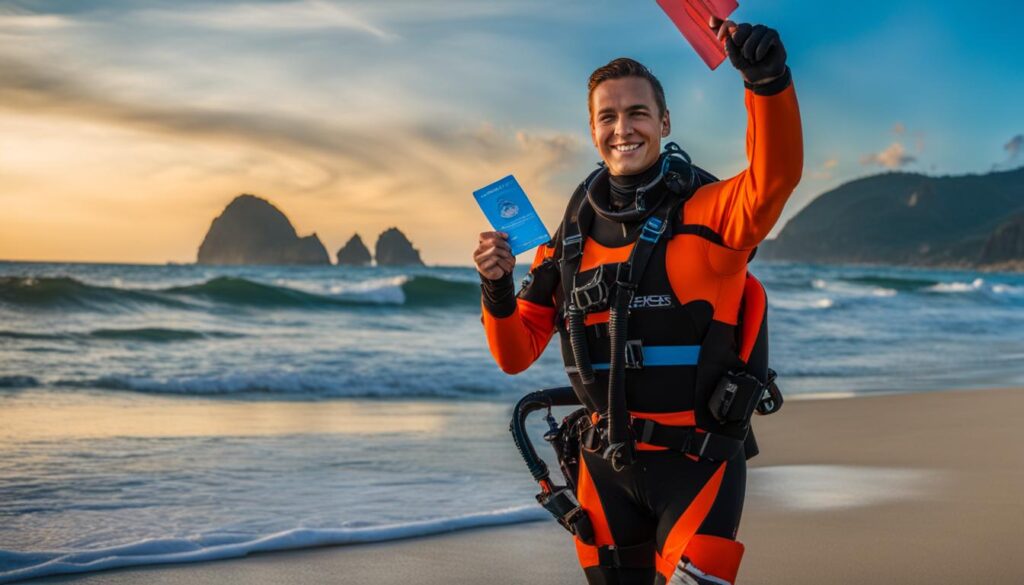
Diving Into Safety: The Critical Importance of Scuba Diving Safety Measures
Scuba diving safety is of utmost importance to prevent accidents and ensure a safe and enjoyable diving experience. By following essential safety measures, such as buddy diving, proper equipment checks, and emergency procedures, divers can mitigate risks and have peace of mind underwater.
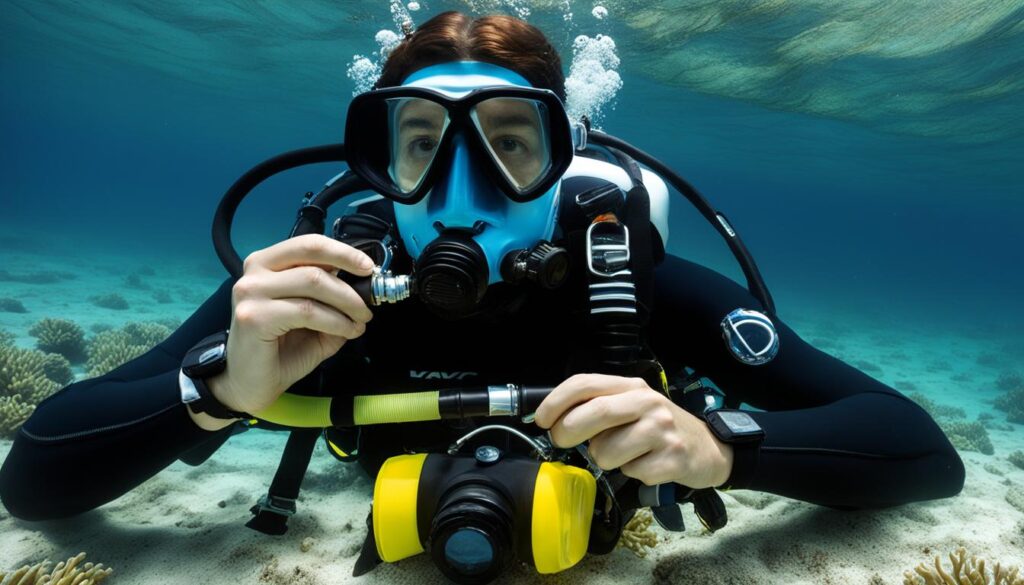
The Most Sought-after Scuba Diving Destinations Worldwide
When it comes to scuba diving, the world offers a plethora of breathtaking destinations that cater to divers of all skill levels. Whether you’re an avid explorer seeking vibrant marine life or a beginner looking for a new adventure, these popular diving spots will surely leave you in awe.
One of the most iconic scuba diving destinations is the Great Barrier Reef, located off the coast of Australia. Renowned for its vibrant coral reefs and diverse marine ecosystems, this UNESCO World Heritage Site offers a once-in-a-lifetime diving experience. Swim alongside mesmerizing fish species, explore intricate coral formations, and witness the beauty of this underwater wonderland.
The Maldives is another paradise for scuba diving enthusiasts. With its crystal-clear turquoise waters and abundant marine life, this tropical destination offers an unforgettable diving experience. Dive into the warm Indian Ocean and encounter majestic manta rays, graceful whale sharks, and colorful coral gardens.
The Red Sea, bordered by Egypt and Sudan, is a top destination for scuba divers seeking rich biodiversity and historical underwater treasures. Explore stunning reefs teeming with vibrant corals, tropical fish, and even ancient shipwrecks. The Red Sea’s year-round warm waters make it an ideal diving spot for both beginners and experienced divers.
When deciding on the best diving spot, various factors need to be considered, including accessibility, cost, and local culture. Some destinations may require advanced certifications or have specific seasons for optimal diving conditions. Researching and planning ahead will ensure a smooth and rewarding scuba diving experience.
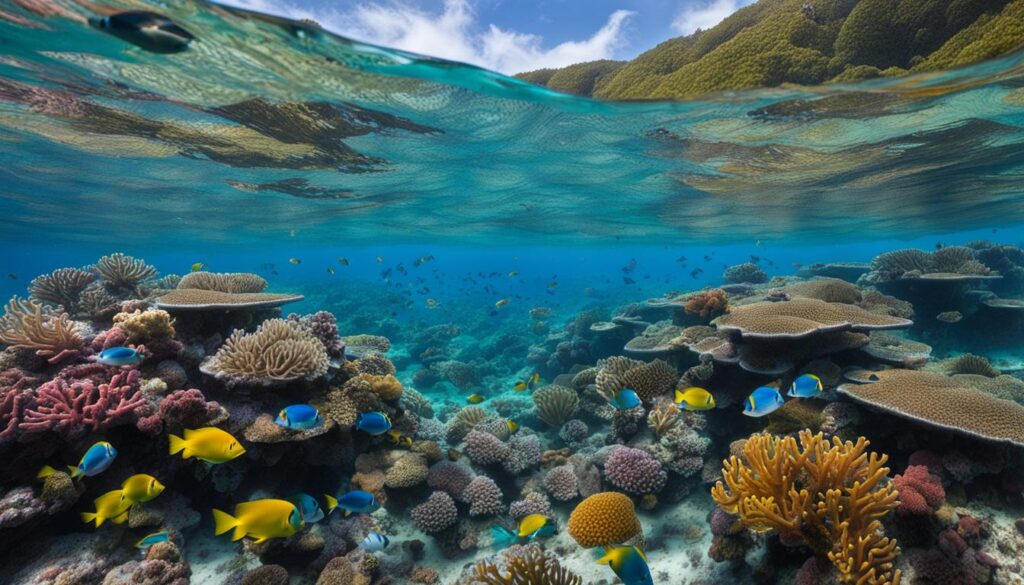
So, grab your gear, dive into an underwater adventure, and explore these sought-after scuba diving destinations that showcase the beauty and wonders of our ocean.
Your Scuba Diving Adventure Starts Here: Discovering the Joy of Scuba Diving
Scuba diving offers an exhilarating adventure like no other. Beyond the surface, a world of wonders awaits you in the depths of the ocean. Not only does scuba diving provide an escape from the ordinary, but it also brings a host of emotional and physical benefits.
Emotional and Physical Benefits of Scuba Diving
Engaging in scuba diving can have a profound impact on your overall well-being. The serene underwater environment provides a peaceful retreat, reducing stress and promoting relaxation. The natural beauty of marine life and vibrant coral reefs can instill a sense of awe and wonder, leading to a heightened mood and emotional well-being. Moreover, the physical demands of scuba diving, from swimming against currents to carrying dive equipment, help improve cardiovascular fitness and strengthen muscles.
The Thrill of Encountering Marine Life on Your Dives
One of the most exhilarating aspects of scuba diving is the opportunity to encounter marine life up close and personal. With every dive, you may come face to face with magnificent creatures like colorful tropical fish, majestic sea turtles, and graceful manta rays. The underwater world is teeming with an abundance of biodiversity, offering an unforgettable experience for nature enthusiasts and adventure seekers alike.
Photographing the Underwater World: An Intro to Scuba Videography
For those who want to capture the beauty of the underwater world and share their scuba diving adventures, scuba videography is the perfect avenue. Through scuba videography, you can document your dives and create stunning visual memories that will last a lifetime. By leveraging the right equipment and techniques, you can transform your scuba diving journey into captivating videos that transport viewers into the depths of the ocean.
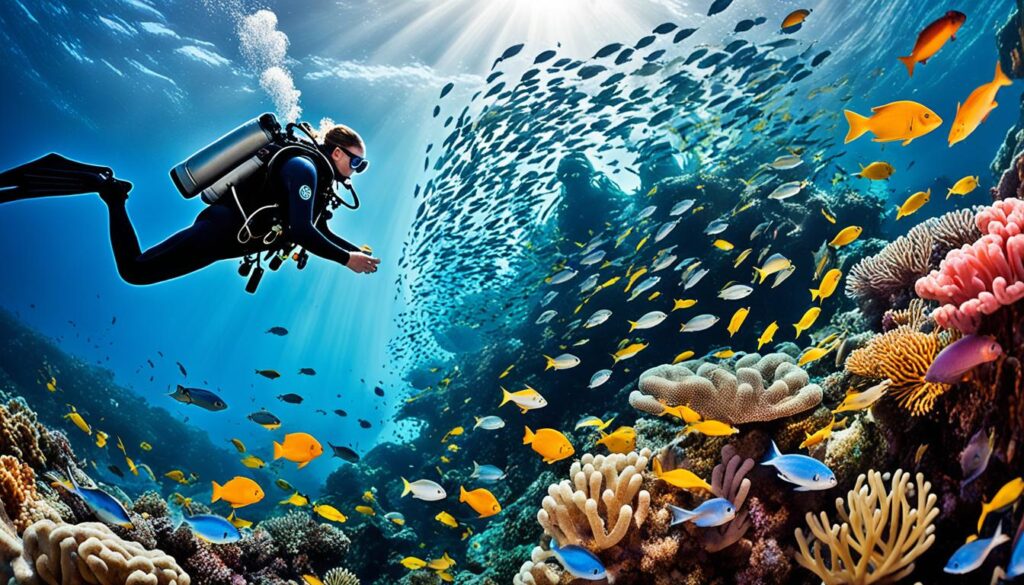
Embark on your scuba diving adventure today and explore the breathtaking wonders that await beneath the surface. Discover the joy of scuba diving, immerse yourself in the emotional and physical benefits, embrace the thrill of encountering marine life, and unleash your creativity through scuba videography. The underwater world is yours to discover and share with the world.
Navigating the Depths: Advanced Scuba Diving Techniques
Ready to take your scuba diving skills to the next level? In this section, we’ll explore advanced techniques that will enhance your underwater experience and make you a more confident diver. From mastering buoyancy control to overcoming the challenges of night diving and deep diving, we’ll cover it all. Additionally, we’ll discuss the importance of sustainable diving practices to protect our beautiful marine ecosystems.
Mastering Buoyancy for Perfect Underwater Movement
One of the most crucial skills for advanced scuba divers is perfecting buoyancy control. Being able to hover effortlessly in the water column allows you to conserve energy and maintain your position while exploring underwater. Practice proper weighting, control your breath, and adjust your buoyancy compensator device (BCD) to achieve optimum buoyancy. With time and practice, you’ll become a master of underwater movement.
Overcoming Challenges: Night Diving and Deep Diving
Night diving and deep diving present unique challenges that require additional skills and preparation. When diving at night, you’ll rely on your underwater flashlight and specialized navigation techniques. Deep diving, on the other hand, requires specialized equipment, such as dive computers, and an understanding of decompression theory. By learning the necessary skills and following safety procedures, you can confidently explore the mysteries that lie in the dark depths.
Environmentally Conscious Diving: How to Dive Sustainably
As responsible scuba divers, it’s essential to minimize our impact on the marine environment. Dive sustainably by following these tips:
- Practice proper buoyancy control to avoid damaging delicate coral reefs or stirring up sediment.
- Avoid touching or harassing marine life and respect their natural habitats.
- Participate in underwater clean-up initiatives to remove debris and protect marine ecosystems.
- Choose dive operators that prioritize sustainable practices, such as reef-friendly sunscreen usage and responsible waste management.
By diving sustainably, we can contribute to the preservation and longevity of our oceans for future generations of scuba divers to enjoy.
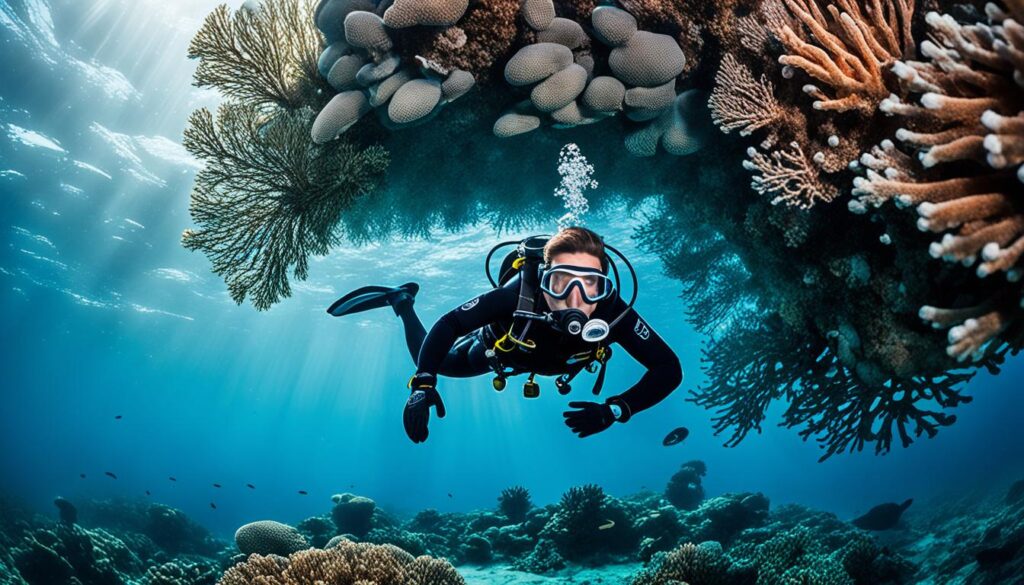
Now that you’re equipped with these advanced scuba diving techniques, you’ll be able to navigate the depths with confidence. Remember to always prioritize safety, continue learning, and dive sustainably to make the most of your underwater adventures.
A Guide to Scuba Diving Outfits and Wetsuits
When it comes to scuba diving, having the right outfit is crucial for comfort, safety, and performance. In this section, we will explore the different types of scuba diving outfits, including wetsuits and drysuits. We’ll also dive into the world of dive computers, dive watches, and how you can personalize your dive gear to suit your needs and style.
Wetsuit vs. Drysuit: Which Should You Choose?
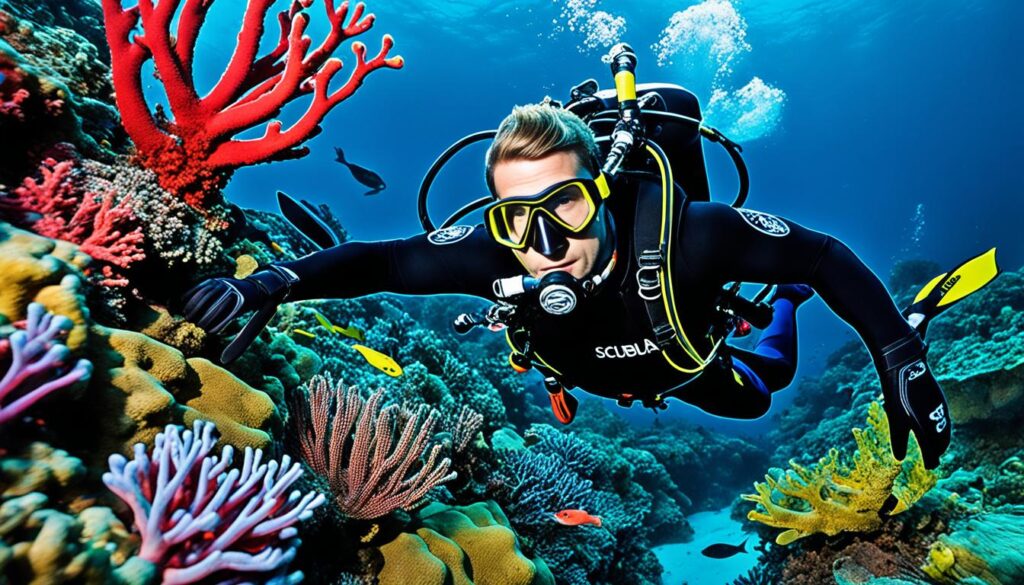
One of the first decisions you’ll need to make when it comes to scuba diving outfits is whether to go for a wetsuit or a drysuit. The choice depends on factors such as water temperature and personal preference. Wetsuits are made of neoprene and provide insulation by trapping a thin layer of water against your body. They are suitable for warmer waters or shorter dives. On the other hand, drysuits are designed to keep you completely dry by creating a barrier between your body and the water. They are recommended for colder water temperatures or longer dives.
Accessories That Make a Difference: Dive Computers and Watches
When it comes to scuba diving, dive computers and watches are essential tools that provide crucial data and safety features. Dive computers help divers monitor depth, dive time, and decompression limits, allowing for safer and more efficient dives. They provide real-time information and can even track multiple gases for technical diving. Dive watches, on the other hand, are not only functional but also stylish. They can be used as backup timers and provide water resistance and durability for underwater adventures.
Personalize Your Dive Gear for Comfort and Style
Personalizing your dive gear is a great way to make it uniquely yours. Whether it’s adding customizations, such as patches or engravings, or choosing accessories that enhance your comfort and style, there are plenty of options available. You can customize your wetsuit or drysuit with personal logos or colors, or invest in gear accessories like gear bags, dive knife holders, or dive light mounts. Personalizing your gear not only adds a personal touch but also ensures that your equipment suits your specific needs and preferences.
With the right scuba diving outfits, including wetsuits and drysuits, and accessories like dive computers and watches, you’ll be well-equipped for incredible underwater adventures. So dive in, explore the depths, and make your mark on the underwater world with personalized gear that reflects your individual style and passion for scuba diving.
Gift Ideas for Scuba Divers: Enhancing the Dive Experience
Looking for the perfect gift for a scuba diver? We’ve got you covered! Whether it’s for a birthday, holiday, or just because, these gift ideas are sure to enhance their dive experience. From practical gear to unique accessories, these gifts are perfect for ocean lovers and diving enthusiasts.
If you’re looking to capture their underwater adventures, consider gifting them an underwater camera. This allows them to document their dives and share their incredible experiences with friends and family.
Another great gift idea is personalized dive gear. Customized wetsuits, dive masks, and fins not only add a personal touch but also ensure a comfortable and stylish dive. With their name or initials on their gear, every dive will feel extra special.
For those looking to enhance their dive safety, a dive computer or dive watch makes an excellent gift. These devices provide important information such as dive time, depth, and decompression limits, allowing divers to stay safe and maximize their bottom time.
Additionally, there are plenty of other accessories that can enhance the dive experience. Consider gifting a waterproof dive flashlight to illuminate the underwater world or a compact dive tool for convenience and preparedness.
Remember, the best gifts for scuba divers are those that align with their interests and needs. Consider their skill level, diving preferences, and any gear they may be missing. With these gift ideas, you’re sure to make a splash and leave a lasting impression on the scuba diver in your life.
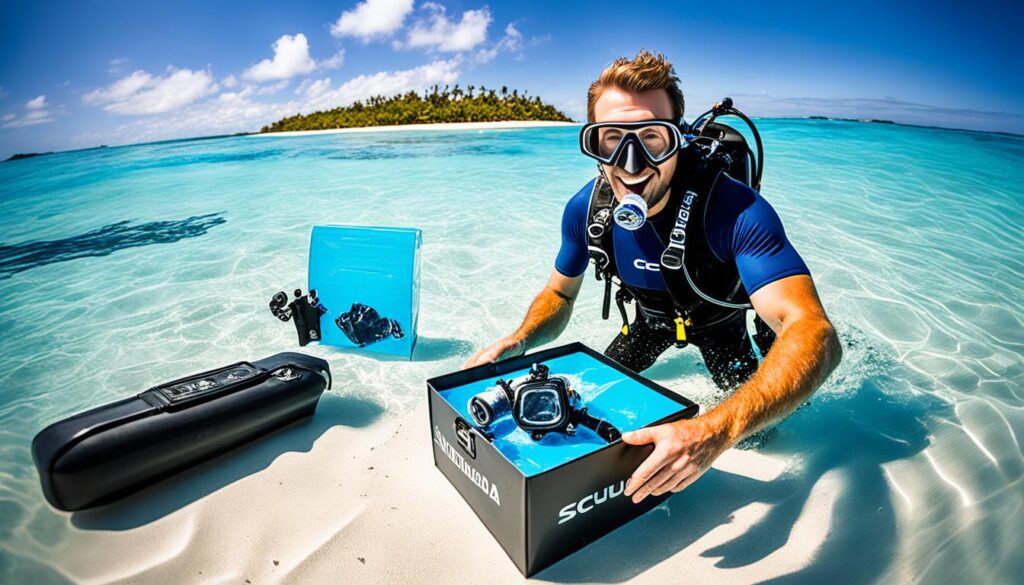
Sharing the Passion: Family Scuba Diving Vacations
Scuba diving is a fantastic activity for the whole family to enjoy together. It offers a unique opportunity to explore the underwater world and create lasting memories. When planning a family scuba diving vacation, it’s important to choose destinations that are family-friendly and provide a safe and enjoyable experience for divers of all ages.
Choosing Family-Friendly Scuba Diving Destinations
When selecting a family-friendly scuba diving destination, there are a few factors to consider. Look for destinations that offer:
- Shallow and calm dive sites suitable for children and beginners
- A variety of marine life to explore, including colorful fish and coral reefs
- Resorts or dive centers with experienced instructors who specialize in diving with families
- Access to other family activities and attractions outside of diving
Popular family-friendly scuba diving destinations include Bonaire, Hawaii’s Big Island, and Curaçao.
Educational and Fun Scuba Activities for Children
Scuba diving can be a fun and educational experience for children. Many dive centers offer special programs and activities designed specifically for young divers. These activities can include:
- Snorkeling tours to introduce younger children to the underwater world
- Scuba diving courses for kids, such as PADI Bubblemaker or Seal Team programs
- Underwater scavenger hunts and games to make diving more engaging
- Interactive educational programs to learn about marine life and conservation
These activities help children develop a love for the ocean and a deeper understanding of the underwater environment.
Ensuring Safety for Young Divers: What Parents Need to Know
Safety is paramount when it comes to scuba diving, especially for young divers. As a parent, there are several important considerations to keep in mind:
- Ensure your child meets the minimum age and certification requirements for scuba diving
- Choose reputable dive centers or resorts with certified instructors and a focus on safety
- Ensure your child is comfortable in the water and has basic swimming skills
- Adhere to all safety guidelines and procedures provided by the dive center or instructor
- Monitor your child’s dive profiles and air consumption during dives
By following these safety guidelines, parents can ensure a safe and enjoyable diving experience for their children.
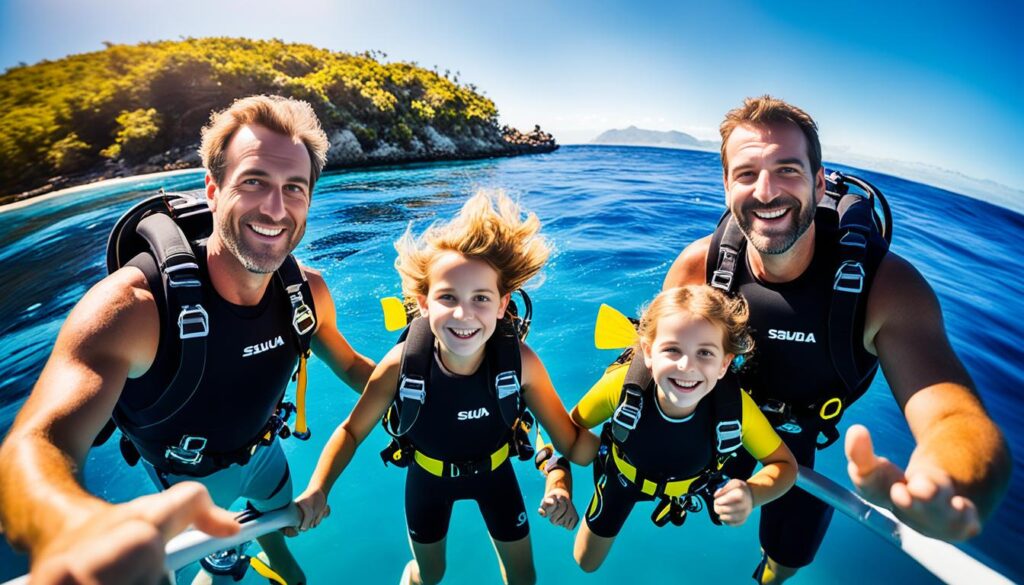
| Destination | Family-Friendly Features |
|---|---|
| Bonaire | Shallow and calm dive sites, resorts with family-friendly amenities, snorkeling opportunities |
| Hawaii’s Big Island | Tropical marine life, snorkeling, family-friendly accommodations and activities |
| Curaçao | Clear waters, colorful coral reefs, resorts with programs for young divers |
Innovations in Scuba Diving: Technology and Trends
This section explores the latest innovations in scuba diving technology, including advancements in dive computers, underwater communication devices, and diving equipment. These scuba diving innovations have revolutionized the way divers explore the underwater world, providing enhanced safety, comfort, and convenience.
In recent years, dive computers have become an indispensable tool for divers, offering real-time information on depth, dive time, and decompression limits. With intuitive interfaces and advanced algorithms, these devices help divers plan and execute their dives with precision.
Underwater communication devices have also witnessed significant advancements, allowing divers to communicate and stay in touch with their dive buddies and surface support teams. These devices enable divers to communicate using hand signals, voice transmission, and even text messages, improving safety and coordination during dives.
Furthermore, diving equipment has seen remarkable innovations, with lighter and more durable materials, streamlined designs, and improved functionality. From wetsuits and dive masks to fins and buoyancy control devices, these advancements in diving gear enhance comfort, performance, and overall diving experience.
Alongside technological advancements, there are also notable trends in the diving community. Eco-friendly diving practices have gained popularity, with a focus on sustainable dive tourism, marine conservation, and responsible diving ethics. Divers are increasingly mindful of their impact on the marine environment and strive to minimize their carbon footprint while exploring the underwater world.
In addition, the use of digital dive logs has become widespread, allowing divers to track their dives, record important details, and share their experiences with the diving community. Digital dive logs offer convenience, accessibility, and the opportunity for divers to showcase their underwater adventures.
The ever-evolving scuba diving innovations and trends continue to shape the diving industry, providing divers with exciting opportunities, enhanced safety measures, and a deeper connection to the underwater realm.
Creating Deep Connections: Scuba Diving as a Tool for Ocean Conservation
Scuba diving offers a unique opportunity to connect with the ocean and foster a sense of environmental awareness. As divers explore the depths, they witness firsthand the beauty and fragility of aquatic ecosystems, which inspires them to take action and become advocates for ocean conservation. By practicing responsible diving techniques and engaging in various conservation initiatives, scuba divers play a crucial role in protecting our oceans for future generations.
One way scuba divers can contribute to ocean conservation is by adopting sustainable diving practices. This includes avoiding contact with delicate coral reefs, respecting marine life and their habitats, and adhering to proper buoyancy control techniques. By minimizing their impact on the underwater environment, divers help preserve the fragile ecosystems they explore.
In addition to responsible diving, scuba divers can actively participate in citizen science projects. These initiatives, often organized by scientific institutions and environmental organizations, rely on divers to collect data and monitor marine life populations. By contributing to these projects, divers assist scientists in better understanding the health of our oceans and identifying conservation strategies.
Beyond their individual efforts, divers can support marine conservation organizations that work tirelessly to protect and preserve the ocean. Through donations or volunteering, divers can help fund initiatives such as habitat restoration, marine species research, and education programs. By actively engaging with these organizations, divers amplify their impact and contribute to larger-scale conservation efforts.
The combination of scuba diving and environmental awareness creates a powerful platform for change. As divers develop a deeper connection to the ocean through their experiences underwater, they become passionate advocates for its conservation. Their collective efforts contribute to a growing movement of environmental responsibility, inspiring others to appreciate the beauty of the ocean and take action to protect it.
Conclusion:
Reflecting on the ultimate scuba diving experiences, you have embarked on an incredible journey to explore the mesmerizing wonders of the underwater world. From vibrant coral reefs to thrilling encounters with marine life, scuba diving has provided you with unforgettable moments and a deep appreciation for the ocean.
As you continue your scuba diving education and adventures, remember the importance of seeking new challenges and expanding your skills in the diving community. Whether it’s mastering buoyancy control, exploring night dives, or diving sustainably, there is always something new to learn and discover beneath the surface.
In all your future dives, a call to preserve and respect our oceans should guide your actions. By practicing responsible diving practices, such as not touching or disturbing marine life, properly disposing of waste, and supporting local marine conservation organizations, you can contribute to the preservation of our fragile underwater ecosystems. Together, we can ensure that future generations have the same opportunity to experience the beauty and diversity of our oceans.
FAQs:
Q: What should I look for in a scuba diving mask?
A: A quality scuba diving mask is essential for clear vision underwater and a comfortable fit. Look for a mask with a tempered glass lens, a low volume design, and a reliable strap system that ensures a secure fit.
Q: How do I choose the right scuba diving fins?
A: Choosing the right scuba diving fins can enhance propulsion and maneuverability in the water. Consider factors such as fin type (open-heel or full-foot), blade design, and fit to find fins that are suitable for your diving style and comfort.
Q: How do I maintain my scuba diving equipment?
A: Proper maintenance of scuba diving equipment ensures longevity and safety during dives. Always rinse your gear with fresh water after diving, store it in a cool and dry place, and regularly inspect and service critical components such as regulators and buoyancy control devices.
Q: What are the different levels of scuba diving certification?
A: Understanding the different levels of scuba diving certification helps divers progress in their skills and experience. The most common certifications include Open Water Diver, Advanced Open Water Diver, Rescue Diver, and Divemaster. Each level builds upon the knowledge and skills gained in the previous certification.
Q: How do I select the right scuba diving lessons and instructors?
A: Tips for selecting scuba diving lessons and instructors ensure a safe and effective learning experience. Look for certified instructors and reputable dive centers, read reviews from previous students, and consider factors such as class size, teaching style, and the availability of additional training opportunities.
Q: What should I do to prepare for my first scuba diving lessons?
A: Preparing for the first scuba diving lessons involves gathering the necessary equipment and familiarizing yourself with basic diving skills. Ensure you have your own mask, fins, and snorkel, complete any required paperwork or medical forms, and be mentally and physically prepared for the learning experience.
Q: What are the essential safety measures for scuba diving?
A: Scuba diving safety is of utmost importance to prevent accidents and ensure a safe and enjoyable diving experience. Essential safety measures include practicing buddy diving, performing proper equipment checks, maintaining a dive plan, and being familiar with emergency procedures such as buoyancy control and ascents.
Q: What are some popular scuba diving destinations worldwide?
A: This section highlights the most sought-after scuba diving destinations worldwide, including the Great Barrier Reef, the Maldives, and the Red Sea. Each destination offers unique diving experiences, from vibrant coral reefs teeming with marine life to thrilling encounters with large marine species.
Q: What are the benefits of scuba diving?
A: Scuba diving offers emotional and physical benefits, such as reducing stress, improving fitness and flexibility, and enhancing overall well-being. The thrill of encountering marine life, exploring new underwater environments, and capturing the beauty of the underwater world through photography also contribute to the joy of scuba diving.
Q: How can I improve my scuba diving skills and techniques?
A: Mastering buoyancy control allows divers to move effortlessly underwater and conserve energy. Additionally, overcoming challenges of night diving and deep diving, including equipment considerations and safety procedures, can help divers advance their skills and expand their diving opportunities.
Q: How can I dive sustainably and minimize my impact on the marine environment?
A: Tips for diving sustainably include respecting marine life and habitats, avoiding touching or removing anything from underwater, and properly disposing of waste. Minimizing the use of single-use plastics and participating in coral reef restoration projects are other ways to contribute to the protection of the marine environment.
Q: Should I choose a wetsuit or a drysuit for scuba diving?
A: Choosing between a wetsuit and a drysuit depends on water temperature and personal preference. Wetsuits provide insulation by trapping a thin layer of water against the skin, while drysuits keep the diver dry by sealing out water entirely. Consider the water temperature and the expected duration of your dives when deciding which suit to use.
Q: What are some essential pieces of scuba diving equipment?
A: Dive computers and watches provide essential data and safety features for dives, such as monitoring depth, time, and decompression limits. Personalizing your dive gear for comfort and style can also enhance your diving experience, with options to add customizations and accessories like dive lights and underwater cameras.
Q: What are some gift ideas for scuba divers?
A: This section provides gift ideas for scuba divers, including practical gear and accessories that enhance the dive experience. From underwater cameras to personalized dive gear, these gifts are perfect for ocean lovers and diving enthusiasts seeking to enhance their underwater adventures.
Q: How can I plan a family-friendly scuba diving vacation?
A: Tips for choosing family-friendly scuba diving destinations and activities can help you plan a memorable vacation that caters to both adults and children. Consider factors such as the availability of shallow dive sites, snorkeling opportunities, and the presence of dive centers with experienced instructors who are skilled in teaching young divers.
Q: What are some ways to contribute to ocean conservation through scuba diving?
A: Scuba diving offers a unique opportunity to connect with the ocean and foster a sense of environmental awareness. This section explores how scuba divers can contribute to ocean conservation efforts through responsible diving practices, participating in citizen science projects to collect important ecological data, and supporting marine conservation organizations through donations or volunteer work.
